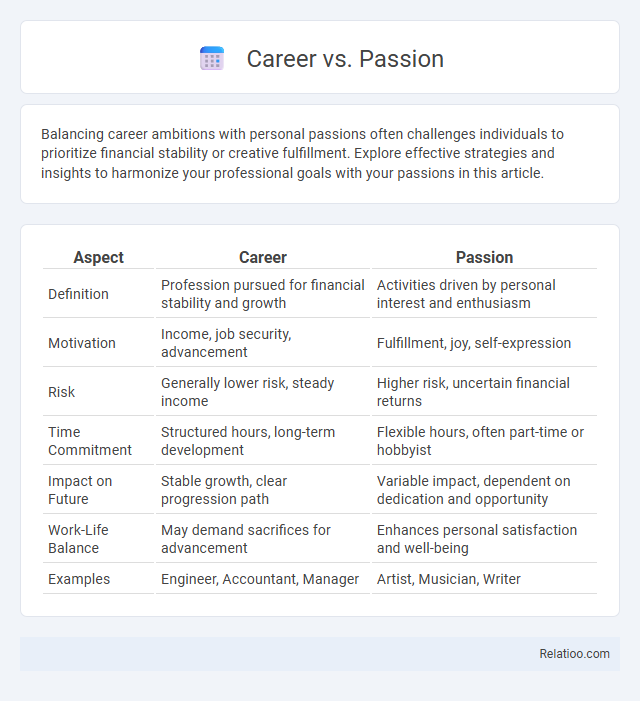Balancing career ambitions with personal passions often challenges individuals to prioritize financial stability or creative fulfillment. Explore effective strategies and insights to harmonize your professional goals with your passions in this article.
Table of Comparison
| Aspect | Career | Passion |
|---|---|---|
| Definition | Profession pursued for financial stability and growth | Activities driven by personal interest and enthusiasm |
| Motivation | Income, job security, advancement | Fulfillment, joy, self-expression |
| Risk | Generally lower risk, steady income | Higher risk, uncertain financial returns |
| Time Commitment | Structured hours, long-term development | Flexible hours, often part-time or hobbyist |
| Impact on Future | Stable growth, clear progression path | Variable impact, dependent on dedication and opportunity |
| Work-Life Balance | May demand sacrifices for advancement | Enhances personal satisfaction and well-being |
| Examples | Engineer, Accountant, Manager | Artist, Musician, Writer |
Understanding Career and Passion: Key Differences
Career represents your professional path focused on skills, job roles, and financial stability, while passion reflects your deep interests and intrinsic motivation driving personal enthusiasm. Understanding the key differences helps you balance practical career decisions with pursuing activities that energize and inspire you. Your fulfillment often arises from integrating both aspects, aligning work with what genuinely excites and satisfies you.
The Role of Passion in Shaping Professional Choices
Passion plays a critical role in shaping your professional choices by driving motivation and long-term commitment, often leading to higher job satisfaction and personal fulfillment. When your career aligns with your passion, it enhances creativity, resilience, and overall performance, making work feel purposeful rather than obligatory. Balancing passion with practicality ensures sustainable success and fulfillment in your professional journey.
Career Stability vs. Pursuing Your Dreams
Career stability offers consistent income, job security, and structured growth, which are essential for financial independence and long-term planning. Pursuing your dreams often involves risk, uncertainty, and potential financial instability but can lead to higher personal fulfillment and creative satisfaction. Balancing career stability with passion-driven goals requires strategic planning to ensure both economic security and emotional well-being.
Financial Security: Career Path vs. Passion Projects
Balancing financial security often requires prioritizing a stable career path over passion projects, as consistent income and benefits ensure long-term economic stability. Passion projects, while fulfilling, frequently lack reliable revenue streams, posing risks to financial well-being. Strategic integration of passion into a career can optimize both income and personal satisfaction without compromising security.
Aligning Passion with Career Opportunities
Aligning passion with career opportunities enhances job satisfaction and long-term success by integrating what you love with market demands. Identifying transferable skills and emerging industry trends allows you to tailor your career path toward roles that resonate deeply with your interests. Your fulfillment increases when passion-driven goals coincide with viable professional growth and stability.
Risks and Rewards: Choosing Passion Over Career
Choosing passion over a conventional career carries risks like financial instability and uncertain job security but offers rewards such as increased personal satisfaction and creativity. You may face challenges like inconsistent income and societal pressure yet gain fulfillment from pursuing work aligned with your values. Balancing passion with practical considerations can maximize both emotional well-being and long-term success.
Success Stories: When Passion Becomes Profession
Countless success stories highlight individuals transforming passion into thriving careers, illustrating how pursuing what they love leads to professional fulfillment. Entrepreneurs in creative industries and tech innovators often turn hobbies into lucrative enterprises by harnessing expertise and dedication. These narratives demonstrate that aligning career choices with personal passions significantly enhances motivation, productivity, and long-term success.
Overcoming Barriers in Pursuing Your Passion
Overcoming barriers in pursuing your passion requires identifying and addressing common obstacles such as fear of failure, financial insecurity, and societal expectations. Developing a strategic plan that balances career stability with passion projects enables sustainable progress toward fulfillment. Leveraging support networks and continuous skill development empowers you to transform passion into a rewarding and meaningful career.
Balancing Career Aspirations with Personal Interests
Balancing your career aspirations with personal interests requires aligning professional goals with activities that ignite your passion and provide fulfillment. Prioritize roles or projects that leverage your strengths while allowing time for hobbies or causes that enrich your well-being. Achieving this balance enhances productivity, satisfaction, and overall life quality.
Making the Right Choice: Career, Passion, or Both
Choosing between career, passion, and fulfillment requires assessing personal values, market opportunities, and long-term satisfaction. Aligning passions with viable career paths increases motivation and productivity while fostering a sense of purpose and fulfillment. Balancing financial stability with meaningful work ensures sustainable success and overall well-being.

Infographic: Career vs Passion
 relatioo.com
relatioo.com